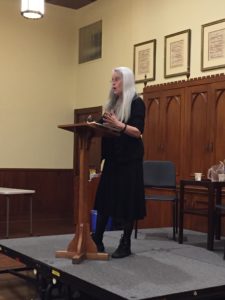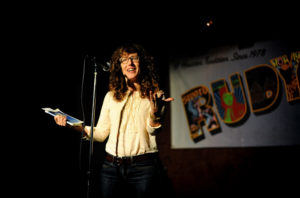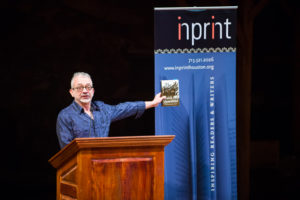Poet Sharon Olds made it back to Houston this fall
December 15, 2016, by Erika Jo Brown
 As 2016 comes to close, Inprint marvels at all the wonderful literary events that took place over the fall months. In November, Brazos Bookstore hosted a reading by poet Sharon Olds.
As 2016 comes to close, Inprint marvels at all the wonderful literary events that took place over the fall months. In November, Brazos Bookstore hosted a reading by poet Sharon Olds.
Olds was scheduled to appear in the 2015/2016 Inprint Margarett Root Brown Reading Series with poet and University of Houston Creative Writing Program faculty member Tony Hoagland. Due to the Tax Day Flood in April, the reading had to be cancelled. A video was made that day during a break in the rain, featuring a reading and conversation between Olds and Hoagland, and Houston poet Martha Serpas in a private home. You can watch that reading here as part of the Inprint Archive of Readings. We were thrilled that Sharon Olds made it back to Houston this fall via Brazos Bookstore so her fans could see her in real time. Here Inprint blogger Erika Jo Brown tells us about this memorable evening.
Appropriately, Sharon Olds’ reading at Christ Church Cathedral was preceded by the choir practice of tweens. Olds is revered—and occasionally controversial—for her delicate and unconventional poems about female sexual awakening and motherhood, among other topics.
On this night, she was introduced by Houston novelist Chris Cander, who extoled Olds’ “incomparable gifts of description” and lauded her latest collection, Odes, as a meditation on “what it feels like to occupy a mature woman’s body, mind and spirit.”


 Last month, Susan Briante visited Houston as featured guest of the
Last month, Susan Briante visited Houston as featured guest of the  On November 21st, the Alley Theatre was already decked for the holidays. A grove of themed trees in the lobby welcomed the
On November 21st, the Alley Theatre was already decked for the holidays. A grove of themed trees in the lobby welcomed the